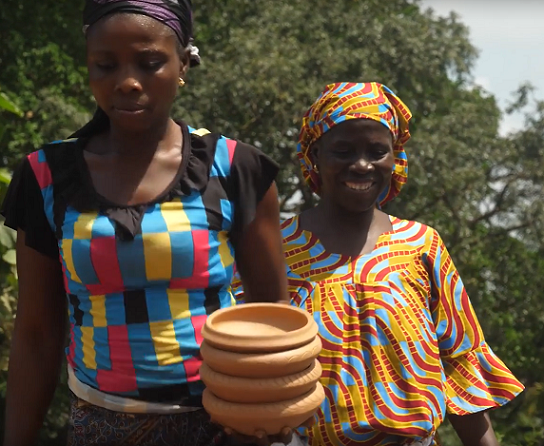Empowering artisans in Ivory Coast: in the footsteps of the women potters of Katiola
Discussion details
In Katiola, a town of 60,000 inhabitants located at 200 km north of the capital Yamoussoukro in Ivory Coast, visitors can easily follow in the footsteps of the potters, at Katiola women’s pottery cooperative. Their craft embodies the richness of the historical, cultural and traditional heritage of the Mangôrô ethnic group.
The ancestral craft of pottery is an integral part of the local economy. It is also the only source of income for the women of the cooperative. Shared from generation to generation, this ancient art is hand-made with the clay that is collected from wet and marshy terrain from the local quarry.
With the support of the European Union, the Italian non-governmental organization AVSI implemented a project to support these women and their cooperative to gain autonomy and skills and thereby improve economic opportunity and livelihood.

Source: Fondazione AVSI https://www.youtube.com/watch?time_continue=566&v=HF2b9Wm0QoU&feature=e…
Fighting inequality and promoting women's work
"This project has changed our lives; we can now make small loans between ourselves and educate our children independently, without asking our husbands for approval. Today, we, the potters, we are proud in Katiola” said Kadidia Coulibaly, President of the potters’ cooperative.
The working conditions of 320 craftswomen as well as seven associations linked to the cooperative have improved. AVSI offered training on the management of small businesses, the organisation also helped the beneficiaries to finance and formalise their activities by registering nearly 50,000 artisans with the Ivorian Chamber of Commerce between 2015 and 2017, and thus giving them the necessary legal framework to practice their activities.

Source: http://www.abidjan-festival.com/afrikymousso/lefestival.php
Decent working conditions and sustainable growth
The success of this project is due to its multidimensional approach, explained Bamba Lassiné, project manager for AVSI in Ivory Coast. The goal was to give these women the tools and means to work in decent conditions and to ensure that they can provide for their family in the long run.
This project responded to the needs to inform the members of the cooperative about their rights and about the institutional framework regulating their trade. Most of them, before this project, worked without a frame of reference, which made them vulnerable as well as their family and by extension their whole community.
The project has now ended but the potters are still in action and the new generation is already on board. “Younger potters will receive training to work at the cooperative and follow in our footsteps,” said Kadidia Coulibaly.
Perpetuating the tradition
The consequences of extreme urbanisation represented a major threat for the potters who risked losing the clay pit from which they extract the raw material for their pottery. According to Bamba Lassiné, protecting this place was essential to ensure the long-term sustainability of the cooperative.
The potters also found a place to sell their products. The benefits of the cooperative helped them to move into a storage house where they store and present their art to the public and finally have control over the product development, merchandising and marketing. The potters can now make better products, increase their sales, and in the end include more women in their cooperative.
***

Log in with your EU Login account to post or comment on the platform.